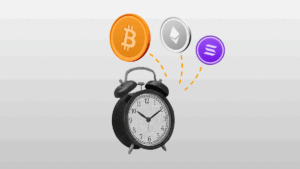
Skills gaps are exciting because they mean the industry is growing. In the case of blockchain, it also means that the industry can’t grow fast enough.
Interrogating the Blockchain Skills Gap
Cryptocurrency is one of the flashiest faces of blockchain technology. However, if you’re really in the know, you know that blockchain is a lot bigger than just Bitcoin, Ethereum and other cryptocurrencies. In fact, experts in the blockchain industry are in increasingly high demand.
When the academic turnout of specialists fails to meet the demand of an industry, it’s called a “skill gap”. It’s a problem that faces many new technologies. While having this shortage is exciting for the industry – it means the industry is growing – it also means that the industry cannot meet its full potential until the skills gap is filled.
What is Blockchain?
The term “blockchain” is the key to visualizing how this open-source technology works. Each block is a discrete piece of data. Each block in a chain is linked to another block and contains all of the blocks that came before it.
So, why is this so complicated? It’s definitely easier said than done. The computer know-how for creating chains out of blocks is hard to come by.
Now, why is it so important? If “because cryptocurrencies” was the only answer, it would be a good enough answer. However, there’s so much more to distributed ledger than that.
For one thing, it’s a secure and transparent way of accessing data. Because the discrete data sets are linked together, it’s very easy to tell if something has been changed. It’s also a very efficient way of storing and sending data.
Understanding where blockchain exists outside of cryptocurrencies is important for understanding how crucial it is to have talent with in-depth knowledge of blockchain technology. It’s also important for understanding why so many experts are required.
The Skill Gap
As mentioned, there’s no shortage of blockchain-related job postings. LinkedIn first made the crisis known with their 2018 jobs report. The report listed “blockchain developer” as the year’s top emerging job. The top skills needed that the report listed aside from blockchain were also programming languages such as Solidity and Node.js.
Demand was determined by looking at the skills of people on the site being hired compared to looking at hirers in pursuit of that skill. According to that report and subsequent analysis, there just aren’t as many blockchain developers to go around. In particular, the most in-demand job titles are software engineer, senior software engineer, software architect, front end and full stack developer.
We did discuss the fact that there are uses for the technology beyond crypto. However, another recent report found that “crypto developer” is a rapidly growing job market. This demand from crypto puts even more demand on the talent market. The report mentions that in order to stand out, job seekers interested in various cryptocurrency and blockchain jobs should be familiar with blockchain development languages such as Hyperledger, Bitcoin Script, Ethereum’s Solidity, and the Ripple protocol.
And the most recent LinkedIn report reveals that blockchain skills are actually the number one most in-demand hard skills in 2020. According to the LinkedIn Talent Blog post, blockchain “is the most in-demand skill in the United States, the United Kingdom, France, Germany, and Australia.” The post also emphasises that financial services are not the only sector that can benefit from blockchain talent. “Recruiters should start becoming familiar with how blockchain works, what its perceived benefits are, and who are the people best suited to help your company explore where this budding technology might have a role.”

What’s a Bitcoiner to Do?
So, what can be done about this shortage?
As mentioned, blockchain development is what’s called a “hard skill”, as opposed to a soft skill. Basically, that means that going off and becoming a blockchain engineer for instance is something that can’t be done without serious time and commitment.
While most of us can’t just decide to get up and fill the skills gap, there are things we can do.
We can help by spreading awareness of the demand for this exciting profession. We can also help by sharing blockchain and cryptocurrency job opportunities, and broadcasting the variety of tasks that can be performed by those who master this skill of the future.



